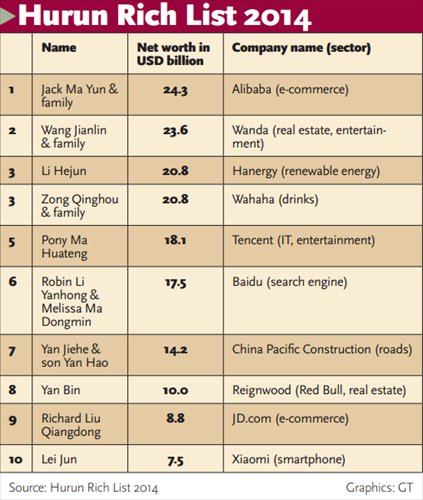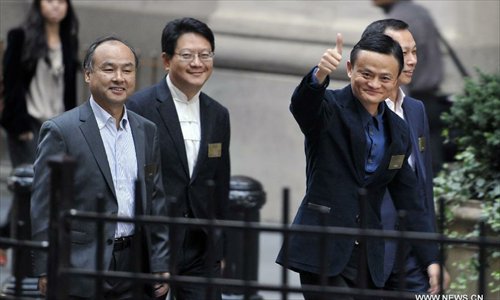
Graphics: GT
Alibaba Group founder Jack Ma Yun has supplanted property tycoon Wang Jianlin at the top of the Hurun China Rich List 2014 released on Tuesday, after the e-commerce giant completed the world's largest-ever IPO with its listing on US stock markets.

Jack Ma (R), board chairman of Alibaba Group, waves as he arrives at the New York Stock Exchange on Sept. 19, 2014. Chinese e-commerce giant Alibaba is set to begin trading on the New York Stock Exchange on Friday. Photo: Xinhua
A 38 percent rise in Alibaba's stock on the first day of trading rocketed Ma and his family into the No.1 position with a fortune of 150 billion yuan ($24.3 billion), five times larger than in 2013.
Wanda Group's Wang, who was crowned the richest man in China last year, fell to second with a net worth of 145 billion yuan, a 7 percent rise over a year earlier.
China's economic slowdown has not hindered its super-rich's accumulation of wealth. There are 1,271 entrepreneurs on this year's list, up from 1,017 on last year's list, although the barrier to entry remains unchanged at 2 billion yuan.
Some 819 members on the list have seen their wealth grow in the past year, compared with 674 last year, mainly due to a boom in Chinese equities and the Chinese government allowing new stock listings after a one-year hiatus, according to the Hurun Report, the organization that compiled the list.
"It has been an amazing year for China's best tycoons despite the jitters about the Chinese economy," Rupert Hoogewerf, chairman and chief researcher of the Hurun Report, told a media briefing in Beijing.
Five new faces have appeared in the Top 10 of this year's list, including Alibaba's Ma, online retailer JD.com's CEO Liu Qiangdong and smartphone maker Xiaomi Technology's CEO Lei Jun. They have replaced real estate tycoons such as Evergrande Group's Xu Jiayin and Country Garden's Yang Huiyan.
"The list vividly reflects that China's industrial structural adjustment and Chinese authorities' efforts to stimulate the vitality of the private economy have worked," said Wang Zhongming, secretary-general of the Chinese Research Institute on Non-State-Owned/Private Economy.
The IT industry has seen the biggest boom, with half of the list's top 10 working in the sector. Entrepreneurs from the manufacturing and real estate sectors, although still making up almost half of the 1,271-strong list, have lost momentum, with their fortunes either growing more slowly or shrinking.
"Property developers used to easily gain exorbitant profits amid the booming property market, but slowing property sales and weakening market sentiment have now squeezed their profits," Yan Yuejin, a researcher with the E-House Real Estate Institute, told the Global Times on Tuesday.
China's super-rich are also seeking political status to go with their wealth. A total of 174 entrepreneurs on the list have political appointments, 14 more than last year. Among the Top 50, 40 percent have senior political appointments, higher than any other country and a "very Chinese characteristic," Hoogewerf told the Global Times.
"The richer they are, the more likely they have a senior political appointment, such as a deputy to the National People's Congress or a member of the [National Committee] of the Chinese People's Political Consultative Committee, partly due to their contributions to job creation and tax bases," Hoogewerf said.
"We also found a growing number of China's fuerdai (second-generation rich) holding positions in local people's congress or political consultative committees," he added.
However, some super-rich have been stripped of political appointments or been placed under investigation amid China's anti-corruption campaign. According to the Hurun Report, 18 entrepreneurs from last year's list are in varying degrees of trouble with the authorities. Eleven of those 18 still made this year's list.
"China's anti-corruption campaign has sent a clear signal that those who made their fortunes through monopoly, corruption or stealing State assets will be punished, which is encouraging entrepreneurs to get rich in a more transparent fashion," Wang told the Global Times.
Fang Wei, ranked 74th on this year's list with a fortune of 15.5 billion yuan and chairman of steel maker Fangda Group, was dismissed from his post as deputy to the 12th National People's Congress, the Xinhua News Agency reported on June 27, without specifying a reason.
Huang Hongming, a property tycoon on this year's list, was placed in criminal detention in November 2013 due to alleged bribery of a former official in Jieyang, a city in South China's Guangdong Province, according to the provincial procuratorate.
The Hurun Rich List is calculated using public information issued by listed companies. For non-listed companies, the valuation is based on a comparison with their listed equivalents using prevailing industry price/earnings ratios.
However, its accuracy and authority has been challenged, due to the fact that its publishing organization receives sponsorship from individual companies, as well as its sharp divergence from a similar ranking released by Forbes magazine.
